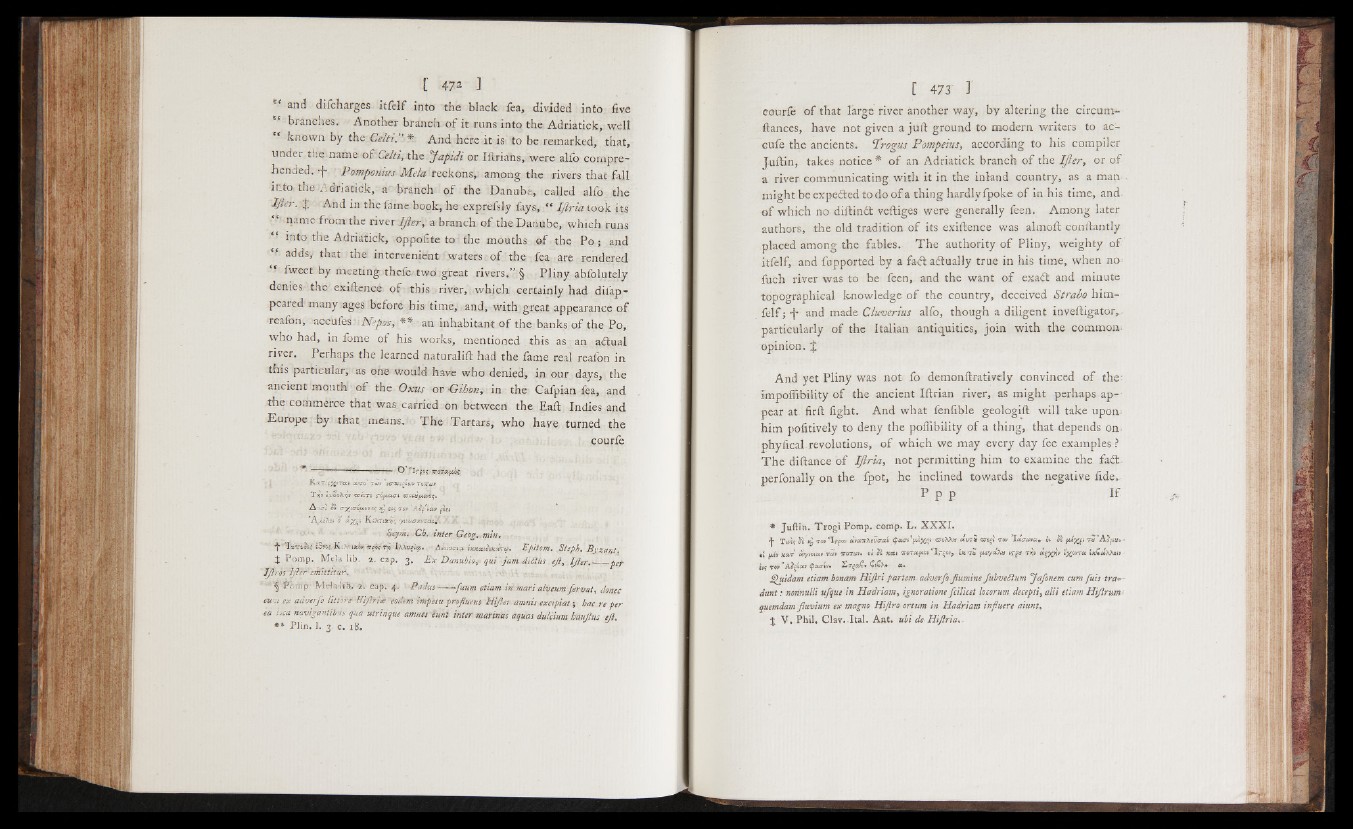
and discharges itfelf into the black fea, divided into five
x‘ branches. Another branch o f it runs into the Adriatick, well
" known by the Celti.'- And here it is to be remarked, that,
under the name o f Celti, the J a p id i or Iilrians, were alfo comprehended.
-}~ Pomponius Mela reckons, among the rivers that fall
into the Adriatick, a branch of the Danube, called alfo the
Ifter.g And in the fame book, he exprefsly fays, “ IJlriatoab its
name from the river IJler, a branch of the Danube, which runs
into the Adriatick, oppofite to the mouths o f the Po ; and
,f adds-,' that the intervenient waters;-of the fea are rendered
“ Sweet by meeting thefe two great rivers.” § - Pliny abfolutely
denies the exiilence o f this river,-which certainly had difap-
peared many ages before his time, and, with great appearance o f
reafon, 'accufes ‘ !Nepos,i**- an inhabitant of the banks o f the Po,
who had, in fome of his works, mentioned this as an actual
river. Perhaps the learned naturalifl: had the fame real reafon in
this particular, as one would have who denied, in our days, the
ancient mouth o f the Oxus or -Gihon, in the Cafpian fea, and
the commerce that was carried on between the Eafl: Indies and
Europe by that means. The Tartars, who have turned the
courfe
— ■ O iratctpiog
K.ccT£f2'E7a,i a .iiQ t ai> e om p iu v T o iru v
T jj» c.-ttooA'/jv ’z s v .T i ropuccoi HJOMfAevoq. '
A ■Jcri be erX'io-ofAivcq te) etq t op Act/iccv flee
’A^e'Aei o KsAt*x??s y iv u tra zrai/. f r
Scymt Ch. inter Geog,.min.
i* IhXtJPiu, - Aihwcrist ixxcaogxaTU), Epitom. Sleph. BjZtfftt,
i Pomp. Mela lib. 2. cap. 3. Ex Danubioy- qui jam Aifiiis ejii IJier. pep
djtrbsfjier-emiititur.
' § roni ps 2. cap. 4. Padus----- fuum etiam in marl alveum fervat, donee
eurn ex adverfo limre'■ dJijMd; eodmimpetu profiuens Hi/let amnis excipiat; hac re per
■ea hca navigantibus qua utrinque amnes bunt inter marinas aquas dulcium hauftus e(i%
** Plin. p. 3. c. 1.8«
courfe o f that large river another way, by altering the circuni-
ftances, have not given a juft ground to modern writers to ac-
cufe the ancients. Progus Pompeius, according to his compiler
Juftin, takes notice * o f an Adriatick branch o f the IJler, or of
a river communicating with it in the inland country, as a man
might be expedted to do o f a thing hardly fpoke of in his time, and
o f which no diftindt veftiges were generally Seen. Among later
authors, the old tradition of its exiftence was almofl: constantly
placed among the fables. The authority o f Pliny, weighty o f
itfelf, and fupported by a fact actually true in his time, when no-
fuch river was to be Seen, and the want o f exait and minute
topographical knowledge o f the country, deceived Strabo him-
Self; -j- and made Cluverius alfo, though a diligent inveiligator,
particularly of the Italian antiquities, join with the common*
opinion. J
And yet Pliny was not So demonilratively convinced o f the
impoffibility o f the ancient Iftrian river, as might perhaps appear
at firft fight. And what fenfible geologift will take upon
him pofitively to deny the poffibility o f a thing, that depends on*
phyfical revolutions, o f which we may every day fee examples ?
The diftance of IJlria, not permitting him to examine the, fa f f
perfonally on the fpot, he inclined towards the negative fide.
P P P I f
* Juftiti. Trogi Pomp. comp. L . X X X I .
•J* Ttves is tC, Tot "Ippov dvocirXsvorcci Q c u r d f A <S/oAAa e c v r i vfftgi to t IcLo-utu*- ot is ¡m%pi t a ’Aipjy»-
•t f*sv Kect dymav rut irotav. oi is xai iroTccpLov \k tb {AsyaAa »ypa tw £%0Kra ixSoiAAam
i»5 to» *Aig»a» <pottr»»• £i€a» «6.
PQuidam etiam bonam Hijiri partem adverfo Jiujnine fubvefium Jafonem cum fuis tra-~-
dunt: nonnullt ufque in Hadriam, ignoratione fcilicet locorum decepti^ alii etiam Hijirumn
quemdam fluvium ex magno Hifiro ortum in Hadriam influere aiunu
% V . Phil. Clav. Ital. A a t. ubi de Hiftria*.